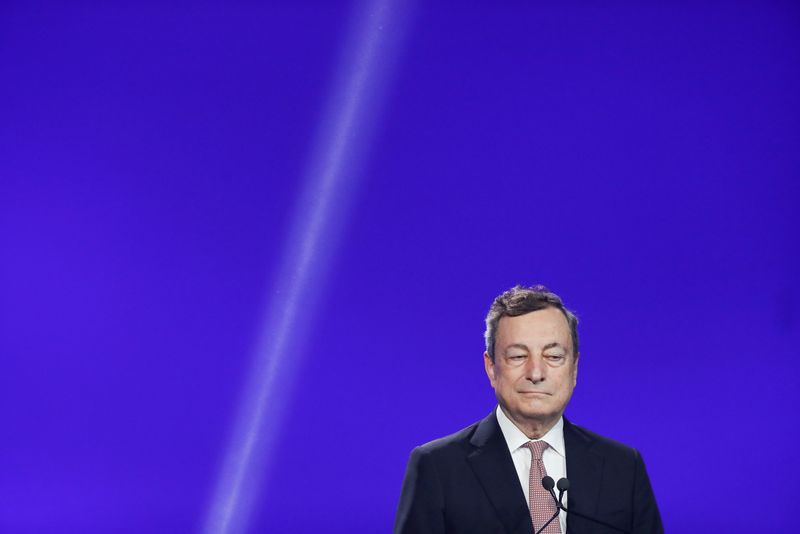By Angelo Amante, Gavin Jones and Giuseppe Fonte
ROME (Reuters) - Prime Minister Mario Draghi set an ambitious reform timeline to relaunch Italy's chronically sluggish economy after the COVID-19 pandemic, but political disputes and cloying bureaucracy are starting to get in his way.
The government has been trying for weeks to overcome divisions in the multi-party ruling coalition over a tax reform and a market competition law which Draghi had promised by the end of July as part of Rome's Recovery Plan.
Presented to the European Union in April, the Plan sets out infrastructure investments and reforms to raise Italy's growth potential and obtain more than 200 billion euros ($234.52 billion) of EU funds over the next six years.
"The delays in the reforms put at risk the next tranches of EU money, and above all they push back what is most important, that the Recovery Plan is put into action fast and effectively," Carlo Bonomi, head of employers lobby Confindustria told its annual assembly on Thursday.
Draghi made a solid start, meeting initial requirements needed to unlock a first tranche of 25 billion euros, which was paid by the EU in August.
He also hammered out a coalition deal to pass a fiercely contested reform of the criminal justice system, while new rules to speed up civil cases are close to approval in parliament.
However, of the 51 goals set in the Recovery Plan for 2021, 38 are left for the fourth quarter, and the government seems to be faltering just when it needs to accelerate.
Special commissioners responsible for overseeing infrastructure projects in the plan recently wrote to the government complaining that red tape is hindering their work, one of the commissioners told Reuters, asking not to be named.
Another commissioner, Pasqualino Monti, who is in charge of ports in western Sicily, warned that if the state bureaucracy continues to act as a brake on projects "we will hit an obstacle as insurmountable as the Great Wall of China".
In a statement after Thursday's cabinet meeting, the government urged ministers to present a road map for all the interventions needed and said it is considering new measures to speed up the projects.
Meetings will be called of all the administrations involved to monitor the progress of the national recovery plan and highlight any hurdles.
Draghi is running up against the same difficulties that have hobbled Italy for decades: political fragmentation, bureaucracy and almost constant electioneering.
Big cities including Rome and Milan will elect new mayors on Oct. 3-4, and the parties in Draghi's national unity government are unwilling to take any steps that could upset their voters.
"The problems Draghi is having now were inevitable," said Eugenio Pizzimenti, a politics professor at Pisa University.
"We have been living under a collective illusion that a group of technocrats could fix everything, but these are political decisions, not technical ones, and conflicting interests are at stake."
NATIONAL SAVIOURS
There are parallels between Draghi and Mario Monti, another non-partisan technocrat who led a similarly broad coalition for just over a year from 2011, when he took office at the height of a debt crisis.
Monti, like Draghi, was initially hailed as a national saviour, but after he passed swingeing budget cuts and a tough pension reform the parties turned against him, his government lost momentum and his personal popularity slumped.
Draghi, whose term ends in 2023, has one big advantage: whereas Monti had to make cuts, he has billions of euros of extra spending to allocate - provided the investment and reform momentum is maintained.
The aim of the delayed tax reform is to simplify the system, reduce income tax and curb evasion, while the competition law is needed to ensure a level playing field for infrastructure investments in ports, telecoms and the national power grid.
Both are being held up by political bickering.
The government, which has said the tax reform will not weigh on public finances, wants to update the taxable value of Italian real estate, which is usually far below real market values.
This is opposed by the right-wing League and Silvio Berlusconi's conservative Forza Italia, key coalition parties.
Both present themselves as staunch defenders of home-owners and say the government's plan is unacceptable because it will result in higher housing levies.
"We defend the right to property. This is not the time to raise taxes," said Antonio Tajani, Forza Italia's deputy leader.
Similar tensions are blocking the competition law, with both parties rejecting plans to liberalise the lucrative concessions to run tourist services on Italy's beaches.
These concessions are traditionally family-owned and passed down from one generation to another, despite repeated calls by the European Commission for them to be offered at open tenders.
Politics professor Pizzimenti said the huge differences in Draghi's coalition meant such disputes were only likely to get worse, resulting in more delays and weak reforms.

"I think sooner or later Brussels will tell us we haven't done what we promised," he said.
($1 = 0.8528 euros)